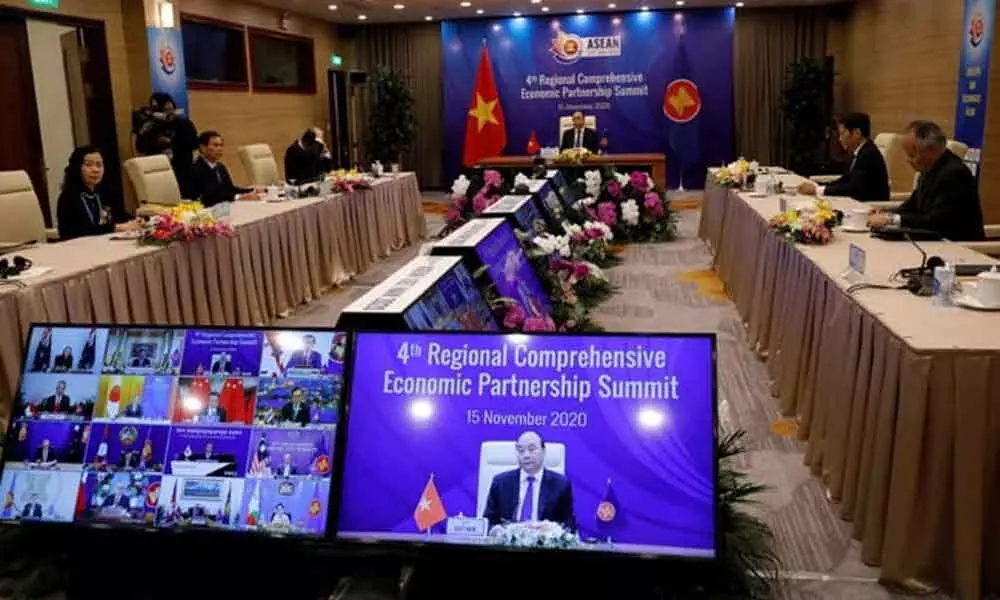Live
- Indian healthcare market projected to reach $638 bn by 2025: Report
- Tollywood Actor Penmetsa Subbaraju Ties the Knot in an Intimate Beach Wedding
- India launching its first-ever auction of undersea mineral blocks for mining
- Maganur Incident Sparks High Court's Fury: Officials Under Fire for Inaction
- Wanted Maoist Commander Chhotu Kharwar killed in infighting in Jharkhand
- G7 foreign ministers urge Israel to comply with international law
- Mewar royal family dispute: Vishvaraj Singh visits Eklingji temple
- Ben Stokes reveals he opted out of IPL auction to prolong England career
- Kannur ADM suicide: Kerala HC accepts wife’s plea seeking CBI probe
- Hyderabad: Fire Breaks Out in EIPL Apartment in Manikonda, No Casualties Reported
Just In
15 Asian Nations Sign China-Backed Trade Pact, India Pulled Out Last Year


15 Asian Nations Sign China-Backed Trade Pact, India Pulled Out Last Year
Vietnam's PM chairs the 4th Regional Comprehensive Economic Partnership Summit
Hanoi: Fifteen countries on Sunday signed a sprawling Asian trade deal seen as a huge coup for China in extending its influence.
The Regional Comprehensive Economic Partnership (RCEP) -- which includes 10 Southeast Asian economies along with China, Japan, South Korea, New Zealand and Australia -- is the world's largest trade pact in terms of GDP, analysts say.
First proposed in 2012, the deal was finally sealed at the end of a Southeast Asian summit as leaders push to get their pandemic-hit economies back on track.
"I am happy that after eight years of complex discussions, today we officially end RCEP negotiations," Vietnamese Prime Minister Nguyen Xuan Phuc said ahead of the virtual signing.
The agreement to lower tariffs and open up the services trade within the bloc does not include the United States and is viewed as a Chinese-led alternative to a now-defunct Washington trade initiative.
The RCEP "solidifies China's broader regional geopolitical ambitions around the Belt and Road initiative", said Alexander Capri, a trade expert at the National University of Singapore Business School, referring to Beijing's signature investment project that envisions Chinese infrastructure and influence spanning the globe.
"It's sort of a complementary element."
But many of the signatories are battling severe coronavirus outbreaks and they are also hoping the RCEP will help mitigate the crippling economic cost of the illness.
Indonesia recently tumbled into its first recession for two decades while the Philippine economy shrunk by 11.5 percent on-year in the latest quarter.
"Covid has reminded the region of why trade matters and governments are more eager than ever to have positive economic growth," said Deborah Elms, executive director of the Asian Trade Centre, a Singapore-based consultancy.
"RCEP can help deliver it."
India pulled out of the agreement last year over concerns about cheap Chinese goods entering the country and will be a notable absentee during Sunday's virtual signing.
It can join at a later date if it chooses.
Even without India, the deal covers 2.1 billion people, with RCEP's members accounting for around 30 percent of global GDP.
Crucially, it should help shrink costs and make life easier for companies by letting them export products anywhere within the bloc without meeting separate requirements for each country.
The agreement touches on intellectual property, but environmental protections and labour rights are not part of the pact.
The deal is also seen as a way for China to draft the rules of trade in the region, after years of US retreat under President Donald Trump which have seen Washington pull out of a trade pact of its own, the Trans-Pacific Partnership (TPP).
Though US multinationals will be able to benefit from RCEP through subsidiaries within member countries, analysts said the deal may cause President-elect Joe Biden to rethink Washington's engagement in the region.
This could see the US eye the potential benefits of joining the TPP's successor deal, the Comprehensive and Progressive Agreement for Trans-Pacific Partnership (CPTPP), said Rajiv Biswas, APAC chief economist at IHS Markit.
"However, this is not expected to be an immediate priority issue... given the considerable negative response to the TPP negotiations from many segments of the US electorate due to concerns about US job losses to Asian countries," he added.

© 2024 Hyderabad Media House Limited/The Hans India. All rights reserved. Powered by hocalwire.com






